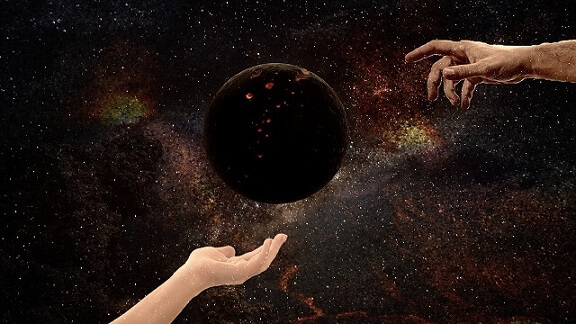Sir Edwin Arnold has written in the beautiful poem Light of Asia that before Enlightenment, while witnessing the miseries of the world, Buddha kept asking the question:
“How can it be that Brahma
Would make a world and keep it miserable,
Since if all-powerful, he leaves it so,
He is not good, and if not powerful,
He is not God?”
At its heart, this beautiful quotation raises two questions. First, is God a sentient entity? Second, if the answer to the previous question is yes, then do our lives matter to God?
Notably, I have skipped the question: does God exist? This omission is intentional. Based on what Science has taught us until this point in 2020, we do not know why the Universe originated in the first place and what exactly was the Singularity before the Big Bang happened (assuming that the Big Bang theory is indeed true). Since the Universe does exist, whether with or without a purpose, we can humbly accept that it was created by somebody and that we do not know the true nature of that somebody. This would mean that we cannot rule out the possibility of the existence of God. God does not have to exist in a human or living form. It (for I do not know God’s gender) may just exist as an imperceivable entity beyond our comprehension. On the other hand, if we argue that the Universe is a simulation or it only exists in the figment of our collective imagination, then too, there has to be a force enabling this simulation or imagination, which for all practical purposes would be God to us (more on this below). Thus, it is safe to assume that there is some entity beyond our understanding that gave rise to the Universe, which we can label as God. Now, let us concentrate on the two questions we asked before.
Is God a sentient entity? The assumption that God has created the Universe makes it an all-powerful entity. With our limited human understanding of consciousness (constrained by our senses and the computational power of our brains and our creations), we can broadly distinguish God’s sentience into three categories. First, God is non-sentient in the human definition of sentience, just like the myriad objects around us. This may mean that after creating the Universe, God ceased to exist as a sentient entity. It may mean that either God was separate from the physical entity that was the Universe before creation or that the “Singularity” itself was God which broke down and creation happened. It also follows from this that the Universe has no purpose and everything is being dictated by the blind probabilities of the interaction between atoms. If this is the case, all questions about the manifestation of God cease to exist.
Second, God is sentient in the human definition of being conscious. Most of the world religions believe in this conception of God. God is symbolized and idealized as a human entity (such as in a human-like physical form like in various schools of Hinduism, in the form of spirits as in animistic religions, or formless like in Islam, among others) which can feel, understand, and respond to our emotions (happiness, pain, pleasure, anger, fear, surprise, etc.). Ergo, it is taken as granted that God is interested in how our lives are going, would be willing to influence them, and may confer joys or punishments on us after we die. This conception of a humanlike sentient God is, of course, fictional in the sense that it is limited by how we sense, think, and act. Another mammal may evolve on our planet itself to wonder about the existence of the world in a totally different manner because its sense organs and brain structure could be completely different from ours. A side-note here is that God may be assumed to have a subhuman-consciousness (like that of a virus, bacteria, amoeba, or ant) but it is hard to visualize then that how it would influence entities much more complex than itself.
Third, God is a supersentient entity. To our ancestors living for millennia in the wild, radiations like Radiowave, Ultraviolet, Microwave, etc. were non-existent. This is because humans do not have the sense organs to perceive them. This is unlike bats that use ultrasound waves to detect their prey. Now bats and humans are both limited in their perception abilities when compared to many snakes that use infrared imaging for prey detection. I am illustrating these examples to highlight the fundamental fact that all our thoughts and actions are limited by our understanding of the world through our senses. How we perceive the Universe would most-likely not be how its Creator would perceive the Universe since it had all the tools at its disposal when it created one. God, as this supersentient entity, would be beyond our wildest dreams, fascinations, and imaginations since it is utterly, truly, mindbogglingly impossible and hopeless for us to understand any aspect of that supersentient entity.
This brings us to the second question: do our lives matter to God? To investigate this question, let us first become familiar with the Kardashev scale. Our ability to advance our civilization is strictly proportional to the amount of energy we can harness. On Earth, the energy we harness comes from the Sun and the natural resources present on the planet. All our food, whether you are vegan, vegetarian, non-vegetarian, or anything else, ultimately comes from the Sun’s energy since it is sunlight that is used by plants for photosynthesis. In 1964, Soviet astronomer Nikolai Kardashev proposed the Kardashev scale which characterizes civilizations based on how much energy they could harness. A Type 0 civilization is like that of a colony of a bacteria which harnesses a negligible amount of energy from its environment whereas a Type 1 civilization can harness the full energy of its source planet. Some astronomers postulate that presently we are at about 0.75 on this scale.
Thus, there is a possibility that we may be a part of a simulation created by an advanced Type 2+ civilization. That civilization would be God to us for all practical purposes. In this case, it is very likely that the aims and objectives of that advanced civilization in creating our Universe would be beyond our understanding. This would mean that the answer to our second question might be beyond our capability to infer. Imagine that you are a bacteria. You do not have the biological and computational resources to see the human being on the edge of whose right hand’s little finger you are currently sitting. You do not have the capacity to wonder when this human being was born, what is he doing right now, did he eat enough food today to not feel hungry, etc. Similarly, in the worst-case scenario, the gap between the cognitive abilities between us and that advanced civilization may be so wide that we cannot comprehend how the members of that advanced civilization think, act, and feel. On the other hand, in the best-case scenario, it may be that the advanced civilization was at some point in history just like us and we are being simulated with a sense of nostalgia or a science experiment or some basic mammalian notion which we can fathom. If either of these scenarios is true, then our lives and our Universe may or may not have a purpose, depending on the wishes of that advanced civilization whose simulation we are. But, then these scenarios would again give rise to the question: who created that advanced civilization in the first place i.e. who is the “ultimate” God?
The other possibility is that we are not in a simulation and thus the “ultimate” supersentient God has created us. In this case too, it seems impossible to know the whims and wishes of that supersentient entity which is beyond our ability to imagine just as it is the case for an advanced civilization discussed above.
In conclusion, what follows from the above discussion is that most-likely either God is not sentient in the human definition of sentience or that God is supersentient and we cannot be sure if it has any interest our “fascinating” lives or “fanciful” afterlives. We can, of course, hope that God does have an interest in our lives and is a “just” God as per the human definition of fairness. But, since we can humbly accept now that we cannot understand the true manifestation of God, as a last resort in our quest of understanding God’s likely manifestation, we can afford to take a few liberties. It may be that as many religions suggest, we don’t need to search for God around us but within is. It may well be that this all-powerful non-sentient/supersentient entity is present within each one of us, within every object surrounding us, within every atom existing in the Universe. That is perhaps why to realize “Aham Brahma Asmi” may well be a worthwhile aim for a human being.

 Keynesian Economics and India's Present Economic Crisis
Keynesian Economics and India's Present Economic Crisis